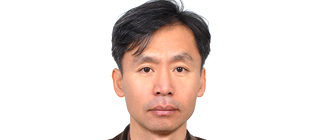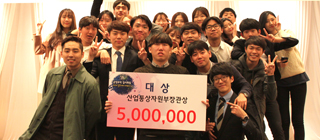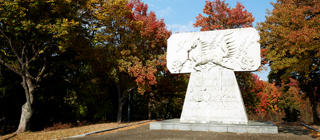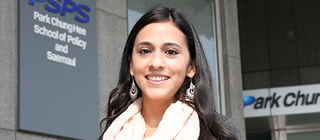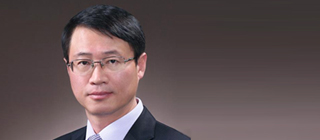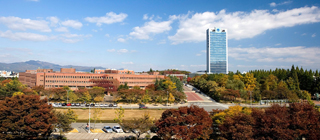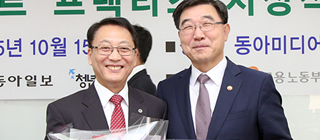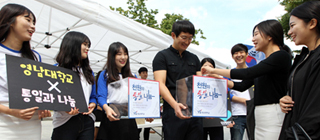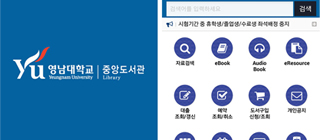-
Published 27 SCI papers in past 3 years, 24 patents registered, technology transfer worth 200 million won Confirmed to be registered in the Marquis' <Who's Who in the World> 2016 issue [November 6, 2015] School of Chemical Engineering Professor Han Sung-soo (51) was awarded the ‘Meditex Award’ in the 2015 academic conference co-hosted by the Korean Fiber Society and the Korean Society of Dyers and Finishers held at BEXCO in Busan on the 5th. He was awarded for his excellent achievements in research and contributions to the development of the fiber industry. The ‘Meditex Award’ was created by the Korean Fiber Society (Chairman Jeon Han-yong) with funding by BSG (CEO Hong Hong-yoon), and it is in its fifth year this year. The award is given to members who made groundbreaking contributions to academic and technological development through creative R&D in medical applications and related textile engineering sectors. Professor Han’s main scope of research is in the polymer material application and he published 27 SCI papers (correspondence author) in the past three years and he has also registered 24 patents in related fields as well. Furthermore, he also made technological transfers worth a total of over 200 million won with bio gel applied products, high-absorption organic gel application products (spray-type mask pack development), and hydro gel film technologies, and has been highly active in research in the medical materials field. Professor Han earned his PhD at Seoul National University and began serving as a professor at the YU Department of Textil Engineering and Technology since 1995. In 2003, he worked as a visiting scholar at the North Carolina State University Department of Textiles in 2003 and at the Purdue University College of Pharmacy in 2010. Currently, he holds the post of director of the YU Organic Gel Cluster Project Team, director of the Textiles Fashion Materials Regional Cooperation Research Center, and vice-director of the IT/Energy/BT Industry Customized Creative Chemical Engineer Fostering team. Outside of the university, he is serving as the editing chairperson of the National Defense Technology Society, and is also working with the Korean Fiber Society, Polymer Society of Korea, and the Korean Society for Biomaterials. He will also be registered in the ‘2016 Marquis Who’s Who in the World’, which is one of the world’s three most authoritative biographical dictionaries.
-
Highlighted for legal analysis such as on customs laws and WTO anti-dumping agreements based on actual cases Grand prize in 2012 and 2014 as well ‘International Economic Research Association’ of the School of International Economics and Business Team proven to be cradle for fostering trade experts [November 1, 2015] <‘International Economic Research Association’ of the School of International Economics and Business that won the ‘grand prize’ at the 2015 Collegiate Trade Remedy Contest> Students of the ‘International Economic Research Association’ of the School of International Economics and Business received the honor of ‘grand prize’ at the ‘2015 Collegiate Trade Remedy Contest’. They took the ‘first place award’ in this contest in 2012 and 2014, and once again outranked the competitors this year proving that the YU School of International Economics and Business is the cradle for fostering trade experts armed with practical capabilities. The ‘College Trade Remedy Contest’ was first held in 2005 hosted by the Trade Committee (Chairman Hong Soon-jik) and sponsored by the Korean Federation of Small and Medium Businesses (Chairman Park Sung-taek) with the goal of enhancing interest in trade remedy programs among college students and to foster experts in trade remedy programs. This year marked its 11th year and a total of 218 people from 11 universities around the nation. After undergoing preliminary reviews in September, six final teams went to the main contest including YU. The main contest that was held at the SMBA DMC Tower DMC Hall in Seoul on October 29 was comprised of theater performances lasting for 40 minutes for each team. In result, the YU ‘International Economic Research Association’ took home the grand prize and won the Minister of Trade, Industry and Energy Award and a five million won cash prize. This year, a scenario was set with traditional trade remedy programs such as anti-dumping, compensation duties and safe-guard systems, as well as the unfair trading area such as infringement of intellectual property rights and violation of indicating places of origin that have been growing problems recently. The teams demonstrated the series of procedures from investigation of cases to trade remedy judgments in the form of a theatrical play. The theme presented by the International Economic Research Association was ‘Dumping of Chinese Plywood and Damages to the Domestic Industry’. They presented the course of resolving industrial damages of domestic plywood manufacturers due to dumping exports by Chinese companies through trade remedy programs of the Trade Committee. 22 students of the YU International Economic Research Association prepared for this for fourth months from the end of June, splitting the roles into the script team, props team, and acting team to make the scenario and play more realistic. They demonstrated the series of procedures starting from fact-finding processes on dumping for plywood exports of Chinese companies, and levying customs duties as investigation for trade remedies, and closed with judgments, receiving good reviews from judges and participants. Kim Hyun-shik (22), a senior in the School of International Economics and Business who participated as the team leader, said, “Instead of focusing too much on dramatic elements, we carefully drew up the scenario to demonstrate the actual roles of the Korean Federation of Small and Medium Businesses and Trade Committee,” while adding, “I think we received good scores by logically expressing the remedy procedures of domestic small and medium businesses by applying legal stipulations such as customs duties laws and the WTO anti-dumping agreement in actual industrial cases.” The YU School of International Economics and Business International Economic Research Association was founded in 1989. This is an undergraduate academic club for researching international economics and it currently has over 100 member students.
-
First place in overall ranking for regional private universities Education conditions, professor research, reputation, and overall ranking improved 4 to 15 places Start-up education 13th, community contribution 17th, employment hope 18th, etc [October 20, 2015] YU (President Noh Seok-kyun) took first place in overall rankings among regional private universities in the ‘2015 Joongang Ilbo College Evaluations’ by rising from as little as four to as much as fifteen ranks in all areas of evaluation. Joongang Ilbo announced the results of its college evaluations for this year on its newspaper on the 20th. According to this, YU rose in ranks in all areas of evaluation by ranking 25th in overall ranking, 26th in education conditions, 18th in professor research, and 25th in reputation. Index Category Detailed Index Score Detailed Index (Points) Detailed Index Rank Professor Research 18th 1.Research funding per professor on average in track 6 1.317 15 2.International academic journal thesis per professor on average in track 62 1.146 13 3.Citations per international academic journal thesis per track 21.9 1.091 9 4.Citations of humanities and sociology translations 2.7 0.987 17 5.Publications in domestic humanities and sociology theses 3.6 1.188 volumes 11 In particular, it ranked 18th in the nation for the professor research sector. This was ranked seven places higher than the previous year. In the detailed index that assesses research capacities, it placed 9th for the number of citations in international theses showing that it had especially high levels of quality for the theses. This is the result of the university-wide effort to improve the research level. As part of this, in 2013, YU became the only university in Korea to introduce the ‘Research Materials Support Project’ that funds a total of four billion won in four years by selecting 25 professors in the top 30% for research capacities. In order to improve the quality of research, it has been implementing an innovative research support program that assesses professor achievements using qualitative indices such as number of citations of theses and technological fee income rather than the quantitative index of the number of theses and number of patents. On this, the Industry-Academic Research Office Director Park Jin-ho said, “We believe that there must be active research for development of education and industry-academic cooperation, so we are preemptively reacting to environmental changes and providing full support.” Top 20 Universities by Track Humanities Track Sociology Track Rank University Rank University 1 Seoul National University 1 Seoul National University 2 Korea University 2 Hanyang University (ERICA) 3 Sungkyunkwan University 3 Sungkyunkwan University 4 Sogang University 4 Korea University 5 Ewha Womans University 5 Ewha Womans University 6 Chung-ang University 6 Kyung Hee University 7 Yonsei University 7 Yonsei University 8 Konkuk University 8 Chung-ang University 9 Hanyang University (ERICA) 9 Chonbuk National University 10 Kyung Hee University 10 Dongguk University 11 Dongguk University 11 Jeju National University 12 Hankuk University of Foreign Studies 12 Hankuk University of Foreign Studies 13 Hallym University 13 Sogang University 14 Sookmyung Women's University 14 Kyungpook National University 15 Inha University 15 Hongik University 16 Chonbuk National University 16 Sunmoon University 17 Pusan National University 17 Konkuk University 18 Sunmoon University 18 Pusan National University 19 Chungnam National University 19 University of Seoul 20 Chonnam National University 20 Yeungnam University 21 Yeungnam University Natural Science Track Engineering Track Rank University Rank University 1 POSTECH 1 POSTECH 2 KAIST 2 KAIST 3 Seoul National University 3 Hanyang University (ERICA) 4 Yonsei University 4 Sungkyunkwan University 5 Korea University 5 Seoul National University 6 Sogang University 6 Korea University 7 Ewha Womans University 7 Yonsei University 8 Ajou University 8 Hanyang University (ERICA) 9 Kyung Hee University 9 Sogang University 10 Chung-ang University 10 Korea University of Technology and Education 11 Hanyang University (ERICA) 11 Dongguk University 12 Inha University 12 Inha University 13 Dongguk University 13 Pusan National University 14 Korea University 14 Yeungnam University 15 Konkuk University 15 Konkuk University 16 Yeungnam University 16 Kyungpook National University 17 University of Ulsan 17 University of Seoul 18 Chonbuk National University 18 Kookmin University 19 Pusan National University 19 Chonbuk National University 20 Kyungpook National University 20 Ajou University In the evaluation by track, which was conducted for the first time this year, all tracks were in the top 30. In particular, the engineering track placed 14th and the natural science track was ranked 16th in the nation. YU was the only regional private university to be ranked in the top 20. It also ranked 20th in the sociology track and 26th in the humanities track. In addition, YU took 18th place for universities from which hiring is desired, 17th in university with highest contribution to the community, 13th in start-up education, and 10th place in foreign professor percentage, and was thus once again recognized for reputation, student education efforts and performance, and excellence of education conditions. On the 16th of this month, YU was also selected for the top university in employment support and student capacity development programs, thus receiving the Minister of Employment and Labor Award. Index Category Detailed Index Score Detailed Index (Points) Detailed Index Rank Reputation 25th 1.University from which hiring is desired 6.2 2.870 18 2.University with proper education in major or general education needed for work 2.8 2.220 24 3.University with excellent student education 2.6 1.850 23 4.University with high contribution to the community 2.9 6.280 17 Index Category Detailed Index Score Detailed Index (%) Detailed Index Student Education Efforts and Performance 26th 1.Graduate start-up activities 3 0.079 9 2.Start-up education ratio 5.8 16.438 13 3.Online lecture disclosure 10 0.414 1 Index Category Detailed Index Score Detailed Index Detailed Index Education Conditions 1.Donations from tax revenue 2.7 3.111% 15 2.Ratio of foreign professors 6.9 17.527% 10 3.Diversity of foreign students 4.8 2.166 points 13 4.Scholarships compared to tuition 11.2 21.255% 22 Universities of Venture Start-ups Rank University No. of Venture Founders 1 Hanyang University (Seoul) 534 2 Seoul National University 449 3 Inha University 387 4 Yeungnam University 379 5 Dong-A University 317 6 Pusan National University 314 7 Korea University (Anam) 308 8 Yonsei University (Seoul) 292 9 Sungkyunkwan University 290 10 Kyung Hee University 262 *Tallied from over 10,000 presidents of venture-certified companies by the Korea Technology Finance Corporation
-
Only private university outside of Seoul area to rank in top 10 Total 8 graduates such as CJ Vice-chairman Lee Chae-wook (Law 64), LG Electronics President Kim Jong-shik (Electronic Engineering 72) Alma Maters of CEOs of Top 30 Companies Rank University 2015.2Q 2014.2Q Fluctuation No. of CEOs Percentage (%) No. of CEOs Percentage (%) No. of CEOs Percentage (%P) 1 Seoul National University 111 31.50 125 34.20 -14 -2.7 2 Yonsei University 47 13.40 41 11.20 6 2.1 3 Korea University 45 12.80 49 13.40 -4 -0.6 4 Hanyang University (ERICA) 16 4.50 18 4.90 -2 -0.4 5 Hankuk University of Foreign Studies 14 4.00 15 4.10 -1 -0.1 6 Sungkyunkwan University 13 3.70 14 3.80 -1 -0.1 7 Sogang University 9 2.60 10 2.70 -1 -0.2 8 Pusan National University 9 2.60 8 2.20 1 0.4 9 Yeungnam University 8 2.30 6 1.60 2 0.6 10 Kyungpook National University 8 2.30 5 1.40 3 0.9 11 Soongsil University 4 1.10 2 0.50 2 0.6 12 Dongguk University 3 0.90 3 0.80 - 0.0 12 Myongji University 3 0.90 3 0.80 - 0.0 12 Ewha Womans University 3 0.90 3 0.80 - 0.0 12 Chung-ang University 3 0.90 3 0.80 - 0.0 16 Waseda University 3 0.90 3 0.80 - 0.0 17 Kyung Hee University 2 0.60 1 0.30 1 0.3 17 Konkuk University 2 0.60 2 0.50 - 0.0 17 Chonnam National University 2 0.60 2 0.50 - 0.0 17 Korea Aerospace University 2 0.60 2 0.50 - 0.0 17 Cheongju University 2 0.60 4 1.10 -2 -0.5 17 Aoyama Gakuin University 2 0.60 2 0.50 - 0.0 17 Ohio University 2 0.60 2 0.50 - 0.0 24 Kyonggi University 1 0.30 - 0.00 1 0.3 24 Dankook University 1 0.30 - 0.00 1 0.3 24 Jeonju University 1 0.30 - 0.00 1 0.3 24 Jeju National University 1 0.30 - 0.00 1 0.3 24 Chungnam National University 1 0.30 - 0.00 1 0.3 24 Carnegie Mellon University (CMU) 1 0.30 - 0.00 1 0.3 24 Harvard University 1 0.30 - 0.00 1 0.3 SKY Subtotal 203 57.70 215 58.90 -12 -1.2 Seoul Subtotal 277 78.7 294 80.5 -17 -1.9 Other Province Subtotal 43 12.2 38 10.4 5 1.8 All CEOs 352 365 -13 [October 27, 2015] Source: CEO Score YU (President Noh Seok-kyun) was ranked ninth in the nation for the ranking of universities that graduated CEOs of the top 30 company groups that lead the domestic financial circles. According to an analysis by ‘CEO Score’ (CEO Park Joo-geun), a corporate management performance evaluation firm, there are a total of 352 CEOs (including chairmen, vice chairmen and presidents) in the top 30 companies. There were a total of eight who graduated from YU, thus ranking ninth in the nation and first in private universities outside of Seoul. It was the only private university outside of Seoul to be ranked in the top 10. The top 10 were made up of SNU with 111, Yonsei University with 47, Korea University with 45, Hanyang University with 16, Hankuk University of Foreign Studies with 14, Sungkyunkwan University with 13, Sogang University and Pusan National University with 9 each, and Kyungpook National University with 8. CEOs from YU are CJ Vice-Chairman Lee Chae-wook (69, Law ‘64), Dongbu Consulting CEO Baek Suk-gi (64, Economics ’72), LG Electronics CEO Kim Jong-shik (62, Electronic Engineering ‘72), Doosan Construction CEO Lee Byeong-hwa (61, Architecture ’74), Hyundai Steel CEO Kang Hak-seo (60, Business Administration ‘79), Lotte Construction CEO Kim Chi-hyeon (60, Trade ’74), Shinsegae Construction CEO Park Geon-hyeon (59, Business Administration ‘75), and Hyundai Powertech CEO Jung Il-soo (57, Mechanical Engineering ’76). Meanwhile, in the Top 100 company CEO education analysis announced by the Monthly Modern Business, a business magazine, in April of this year, YU was ranked sixth nation-wide and first in universities outside of Seoul. YU was also ranked sixth in the nation and first outside of Seoul for two consecutive years in the KOSDAQ Association’s ‘CEOs of KOSDAQ Listed Companies’, displaying the power of alumni leading Korea’s financial world.
-
Former Assitant Secretary Bermeo, next-generation leader who took major roles as college professor and in the government in her 20s “I will think of a ‘Saemaul Undong’ project that can be applied to Ecuador” Park Chung Hee School of Policy and Saemaul, 83 people from 34 countries newly enrolled for second half of 2015 [October 26, 2015] “I am convinced that the Saemaul Undong and Saemaul spirit will help in the development of my home country, Ecuador.” Former Assistant Secretary of Ecuador Maria Bermeo (30, photo), who took her first class as a new student for the YU Park Chung Hee School of Policy and Saemaul master’s degree course, voiced her impression with an air of excitement. Despite being only 30 years old, she has served as a college professor as well as holding important government posts and is judged to be a key leader of the future in Ecuador. The reason why this lady with such a bright future selected YU was to learn the ‘Saemaul Science’. She said, “The purpose of my study here is to learn the systematic theories and practical policies of the Saemaul Undong, as well as the Saemaul spirit and look for ways to apply it to fit my country’s situation.” She already holds a master’s degree. After graduating from the Universidad del Azuay in Ecuador, she earned her master’s degree at the Monterrey Institute of Technology and Higher Education, Monterrey Campus in Mexico. From June 2010 to September 2012, she served as a professor at her alma mater, Universidad del Azuay, and then worked as the Assistant Secretary at the Education and Science Ministry from 2013 to February 2015. She said, “After joining the government and working on tasks related to higher education, science technology and innovation, I took the development of Korea as a role model in many instances. The Saemaul Undong and Saemaul spirit was always a keyword in this.” She added, “At the Park Chung Hee School of Policy and Saemaul, I not only have the opportunity to share knowledge with professors and experts having various academic backgrounds, rather than leaning to any one specific field, and I can also study with public officials and policy legislators and workers from various countries to share the success cases and experiences of different countries, while creating a global network” as she once again explained the reason why she chose YU. She said that when she first visited Korea to attend a seminar on public policy two years ago, she was very impressed with the development of Korea starting at Incheon Airport. She said, “In addition to the Korean culture and the hospitality of Koreans, I loved everything about Korea from the educational environment of universities to its teaching methods,” and added, “During my studies here, I am planning to study the Korean language so that I can go back to my home country after gaining not only academic knowledge, but also a deeper understanding of Korea.” On the other hand, on October 19, the YU Park Chung Hee School of Policy and Saemaul greeted 83 students from 34 countries, including Former Assistant Secretary Bermeo and senior-ranking public officials and professionals of various countries as new students for the later term of 2015. These students who were admitted after a 8.9 to 1 competition rate will complete a one-year and six-months master’s degree program (lectures for 3 semesters, thesis class for 1 semester), and become masters of the Saemaul Science if there thesis passes. It is judged that the reason why important figures from around the world are gathering at YU is because of the influence of past graduates of the Park Chung Hee School. The 120 plus graduates of the Park Chung Hee School have taken important positions in their governments and society and are spreading the Saemaul Undong. Gasana Richard (40), who earned his master’s in public policy and leadership at the Park Chung Hee School in May 2014, was recently elected as mayor of Gatsibo in Rwanda, while Demeke Atlaw Melke (38) is currently the assistant-director of the agricultural bureau in Amhara, Ethiopia. <Orientation for 2015 Park Chung Hee School Newcomers> The Park Chung Hee School of Policy and Saemaul, which was established in November 2011 to share the Saemaul Undong and Korea’s development experience with public officials and employees of the public sector in emerging countries and to foster global Saemaul leaders, was selected in March 2014 for the KOICA ‘Community Development Leader Fostering Master’s Degree Program’ and in April 2015 for the KEITI’s ‘Emerging Country Public Official Master’s Degree Program’, and has constructed an unparalleled position as an institute for fostering experts in the Saemaul international development experts. A total of 342 international students from 57 countries have enrolled and 123 people from 37 countries received their master’s degree as of October 2015.
-
Excellent research achievements and contributions to development of the pharmaceutical industry Development of drug delivery system such as new improved drugs and research on new drug formulation [October 23, 2015] College of Pharmacy Professor Yong Cheol-soon (59) received the ‘Yoon Gwang-yeol Pharmacy Award’. At the 2015 Pharmaceutical Society of Korea Fall Academic Conference held at the Hotel Inter-Burgo EXCO in Daegu on the 22nd, Professor Yong Cheol-soon received the Yoon Gwang-yeol Pharmacy Award for his excellent research achievements and contributions to the development of the pharmaceutical industry. The ‘Yoon Gwang-yeol Pharmacy Award’ is an award co-sponsored with the Pharmaceutical Society of Korea with funding by the Buchaepyo Gasong Foundation (President Yoon Do-joon, Chairman of Dong Wha Pharm. Co.). It is the eighth year of this award that is granted to members who made great contributions to the development of the pharmaceutical industry and displayed excellent research achievements for at least ten years. Professor Yong developed various drug delivery systems including new improved drugs and researched new drug formulations. He is currently engaged in research for next-generation drug delivery substances such as research on advancing drug delivery nano-particles to reduce tolerance and side effects while maximizing effects of anti-cancer drugs. In the past ten years, he has been highly active in research and published 182 SCI theses, while registering and applying for 37 patents. Professor Yong earned his PhD at the University of South Carolina in the United States and was appointed as a professor of pharmacology at YU in 1991. He also served as the Dean of the YU College of Pharmacy, Dean of the Graduate School of Clinical Pharmacology, Chief of the Pharmaceutical Development Research Center, and Director of the BK21 Project Team. Outside of the university, he served as the chairperson of the Korean Society of Pharmaceutical Sciences and Technology, Vice Chairman and Yeongnam District Director of the Pharmaceutical Society of Korea, chairperson of the 2013 AFPS (Asian Federation for Pharmaceutical Sciences) organization committee and its senior vice-chairman. Furthermore, he was registered in the ‘Marquis Who’s Who in the World 2015’, which is one of the world’s top three biographical dictionaries, as well as the ‘IBC Top 100 Professionals’ of the Cambridge IBC (International Biographical Centre) of England. Professor Yong is currently active in various areas for the development of Korea’s pharmaceutical industry by serving as the APFS chairperson, chairperson of the Pharmaceutical Sciences and Technology Subcommittee, Vice-chairperson of the 2017 FIP (International Pharmaceutical Federation) Seoul General Assembly, Korean Association of Pharmacy Education Practice Committee chairperson, Health Insurance Review & Assessment Service Medicine Coverage Assessment committee member, Ministry of Food and Drug Safety advisor, National Health Personnel Licensing and Examination Board Pharmacy Foreign University Accreditation Review Committee member, Ministry of Health and Welfare independent review process reviewer, and vice-chairperson of the Korean Pharmaceutical Association International Committee.
-
Upon analyzing the executives of the global steel company, POSCO, it was found that YU placed fifth among in the number of alumni holding executive positions. According to the announcement by the news journal financial media, Sisa Biz, based on the Financial Supervisory Service’s electronic announcement system data (Oct 12, 2015) on the executives of POSCO, there were a total of 20 colleges from which the 84 executives of POSCO graduated from. From them, a total of four executives were from YU following Seoul National University (23), Pusan National University (10), Hanyang University (8), and Korea University (7). Yonsei University and Kyungpook National University tied with YU at four each. A total of 53 of the executives majored in engineering, including 38 in metallic engineering. Twenty-seven had studied overseas accounting for 32.1%, and 17 of them studied in the United States. Meanwhile, it was found that there were many YU alumni among the Hyundai Group executives as well. According to Break News in June (Jun 1, 2015), 4.5% of the executives were from YU, following Pusan National University (12.1%), Seoul National University (7.2%), Korea University (8.7%), and Yonsei University (6.1%). At Hyundai Heavy Industries, YU alumni accounted for 7.9% of the executives, following only Pusan National University (17.2%) and University of Ulsan (9.9%). According to the ‘2013 Business Report’ submitted to the Financial Supervisory Service on March 31, the final education of the executives (excluding outside executives) in the top ten Korean companies in total market value stated in an article by Chosun Ilbo (Apr 2, 2014), YU placed 10th nationwide for having the most alumni in the top 10 companies including the 13 executives in Samsung Electronics, which is first place in total market value (Samsung Electronics, SK Hynix, Naver, POSCO, Samsung Life, Hyundai Heavy Industries, Hyundai Motors, Kia Motors, Hyundai Mobis, Lotte Shopping).
-
Construction of career development system... Designing college life on one’s own Activation focusing on users, continuous upgrade of system [Oct 15, 2015] YU President Noh Seok-kyun takes a photo after receiving the Ministerial Award from Minister of Labor and Employment. YU (President Noh Seok-kyun) was selected as the best university in the career development sector in the first 2015 Youth Dream College ‘Best Practice’ Awards and received the Minister of Employment and Labor Award. The Donga Ilbo Youth Dream Center and the Ministry of Employment and Labor held the ‘2015 Youth Dream College Best Practice Awards’ with the attendance of over 50 people including the deans of the awarded universities, professors, Minister of Employment and Labor Lee Gi-gwon, and Donga Ilbo/Channel A President Kim Jae-ho at the Donga Media Center 20th Floor CC Cube at Jongno-gu, Seoul in the afternoon of the 15th. The Best Practice Awards, which was held for the first time this year, was designed to share colleges with exemplary systems and cases for other colleges among the 25 colleges selected as Youth Dream Colleges, selected by being assessed to have youth-friendly education and research talent fostering capacities. This aims at making known the efforts of universities, while also sharing exemplary cases with other colleges. In accordance to such goal, six outstanding colleges were selected for each sector and YU was selected for the career development sector and received the Minister of Employment and Labor Award. The hosts assessed that YU’s school-wide career development process, or the CRM (Career Road Map) system was constructed to allow students to set their goals upon admissions and helped them to systematically design their college life. Furthermore, they evaluated that continuously upgrading the system, while promoting it to being user-oriented for not only curriculum programs, but also extra-curricular and student guidance programs. Also, they stated that YU distinguished itself by constantly checking the satisfaction level of education recipients through the ‘Y-Type Human Resources Education System’, and introduced other outstanding cases such as measuring the four core capacity education achievements for students, and examining the satisfaction level and reputation of YU graduates for companies. In addition, 500 HR personnel of companies were examined to improve the reputation of students and the satisfaction level of education, which were judged to have set examples for other universities. On this, YU President Noh Seok-kyun said, “Our university provides support to all students so that they can identify their aptitude and develop their career accordingly during their four years in college so that they may properly utilize their capacities in society.” He added, “The college, students, and even the society must work together to overcome the youth unemployment issue.” Inha University (Fostering of Youth Entrepreneurs) and the Korea University of Technology and Education (industry-academic linking) also received the Minister of Employment and Labor Award. The Donga Ilbo President’s Award went to Dongguk University (Career Development), Kwangwoon University (Young Entrepreneur Fostering), and University of Ulsan (industry-academic linking). Minister of Employment and Labor Lee Gi-gwon said in his congratulatory address, “I am thankful for the universities that took the lead in systematic career education from the time of admission to graduation so that youths can have dreams, and for playing a leading role in doing so.” He added, “By fostering future-oriented human resources with practical expertise, creativity, and a sense of community, it will not only help youths, but it will also expand the job territory of Korea.” Minister Lee also cited a passage from Don Quixote, saying, “I hope that youths can dream dreams that are unattainable, and dream of a better world,” while adding, “The government will provide full support so that the young generation will no longer have to give up on their dreams, but become a generation that dreams more.” Donga Ilbo President Kim Jae-ho said in his greeting, “The youth unemployment issue has recently become a global social issue,” adding, “I hope that more universities will share exemplary cases of youth dream colleges and provide more systematic and realistic help.” YU President Noh Seok-kyun and other school representatives that won the Minister of Employment and Labor Award take a photo with Minister Lee Gi-gwon and Donga Ilbo President Kim Jae-ho (fourth from right).
-
Charity drives held around campus including library and streets. Joined by employees, faculty and students raising total of 6,715,400 won for the Reunification Sharing Fund Donated in full to the Reunification and Sharing Foundation [October 8, 2015] “The thousand won you share can be the cornerstone for reunification. Fellow school mates, let’s make reunification happen with our two hands.” From September 14, YU (President Noh Seok-kyun) held a campaign to collect reunification preparation funds. The YU student body and the Unification Issue Research Center (Chief Kim Young-soo) went on a ‘Thousand Won Sharing for Reunification’ donation campaign. As of October 2, a total of 6,715,400 won collected. Considering that the donations were made by young students, this is not a small amount of money. For this three-week-long campaign, the student body and the Unification Issue Research Center posted a message on the school homepage and Facebook asking for volunteers, and donation boxes were installed in areas with high pedestrian traffic such as the library and bank. They also made a Reunification Sharing Fund account so that anybody can make donations. They expressed a strong passion for reunification by delaying the charity drives while the ‘2015 Dokdo Protection Hip Hop Festival’, which was held together by the student body and Social Run To You (CEO Kim Tae-woo, 2011 YU student body president), was held in the evening of the 3rd at the outdoor auditorium. In result, 2 million won was raised on site to end the Reunification Sharing Campaign. YU student body president Kim Su-hyeon (26, School of Architecture, senior) said, “It was disappointing that our generation does not have much wish for reunification as we did not directly feel the sadness of being separated,” and added, “Preparing for reunification that will surely come, whether in our generation or the next, is meaningful and must be done. That is why we planned the ‘Thousand Won Reunification Sharing’ campaign. I hope that this campaign will make us desire reunification more.” Professor Kim Young-soo, who is the chief of the YU Unification Issue Research Center that co-planned this campaign, also worked hard in this campaign explaining the goal of this campaign and urging participation in class and to fellow professors.“ Professor Kim explained, ”Reunification is the biggest dream of our people, but we must make preparations for this to be a ‘blessing’.“ He also added, ”When just a thousand won is gathered at a time, and this continues, an expressway to unification will open wide.“ The YU student ambassadors, ‘YU Love’ also chipped in for this campaign. During recess from class, they engaged in street PR activities with the student body and installed and operated a donation tent in front of the central library. Choi Han-geul (25, Department of Business Administration, senior) who gladly made a donation on his way to the central library said, “Though I never gave reunification much thought, I was moved to see my school mates engaging in such campaign. I believe that when not just members of YU, but everyone in Korea contribute just a little bit each, it will become a path of hope to reunification.” YU President Noh Seok-kyun also sent a letter to the faculty during the campaign encouraging participation. In the letter, Mr. Noh said, “I am very proud of our students voluntarily making the Reunification Sharing Fund Campaign in hopes and preparation for reunification, which is the biggest dream of our people. I hope that we take this opportunity to think about the future of the unified Korea.” In result, school employees donated as little as ten thousand won to as much as two hundred thousand won to the Reunification Sharing Fund account, and over 50 YU professors also participated in preparation for reunification. The donations raised through this campaign by the YU student body and the Unification Issue Research Center donated all of the funds to the Reunification and Sharing Foundation. <See Article> Chosun Ilbo (Oct 8, 2015) http://news.chosun.com/site/data/html_dir/2015/10/08/2015100800378.html
-
Smart phone seating, ‘library app’ Constructed mobile-based library facility integrated management system Leading the education and administration sector ‘smart campus’ service and ‘3rd place in the world for e-learning’ [October 12, 2015] The YU (President Noh Seok-kyun) library is now in the palm of your hand in your smart phone. Following the world-class ‘e-learning’ education, mobile device-based administrative support systems were also introduced, as YU takes a step closer to the construction of the smart campus. Recently, YU constructed the ‘library facility integrated management system’ to provide efficient and comfortable library facility usage services to students. It will undergo a month of test services during October and after collecting opinions and suggestions from students on errors and complaints, it will begin operations in November. Students can install the ‘YU Central Library Application’ (hereinafter called library app) in their smart phones to use the service. Using the library app, students can search materials, renew rentals, request book purchases, etc through their smart phone. In particular, you can use the ‘mobile seating assignment service’ in the library app, which is expected to be of great help for student’s uses of the library. In the past YU students were assigned library seats through the integrated seat assignment device installed on the first floor of the central library and the second floor of the science library. But by adding the library seating assignment function in the library app, students can check library seating status from anywhere and reserve their seats. YU Department of Forest Resources and Landscape Architecture junior, Kim Su-jeong (21) said, “During exams, there were times that I had to go back disappointed even after coming to the library early in the morning and waiting in line for the seat assignment device because there were no seats left.” She added, “I no longer have to wait in line and can check in real time using the library app for whether there are any seats available and then make reservations right away.” In addition to making reservations for seats in the library using the library app, YU also made it possible for students to reserve digital materials, PC and DVD corners in the digital information room, and even group study rooms. YU President Noh Seok-kyun said, “In addition to education and research, advancing administrative services is also one of the top 10 policies of our universities,” and added, “We will do our best so that students will be able to more efficiently access and use such administrative services.” YU has already been recognized for its excellence in ‘e-learning’ by the world’s top MBA program, The Wharton School at the University of Pennsylvania and the world college ranking institute QS, ranking third in the world for the e-learning sector by ‘The Wharton-QS Stars Reimagine Education Awards 2014’ (Education Innovation Award). Thus, YU has already been recognized to have reached world-best levels in making education sectors smart. In light of this, the college’s administrative support system is also becoming smart. It introduced the first campus emergency rescue service ‘YU Care Call’ app for the first time in Korea in June, and with this library app, it is quickly going constructing the smart campus for YU.
